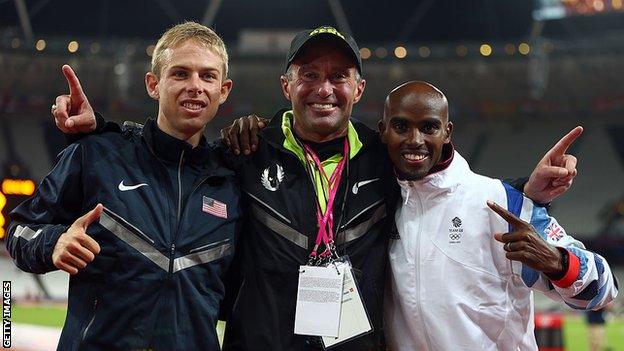Alberto Salazar: Nike Oregon Project closed down after head coach's ban
- Published

Alberto Salazar (centre) alongside Mo Farah (right) and Galen Rupp (left) at the London 2012 Olympics
The Nike Oregon Project has been closed down after head coach Alberto Salazar was banned for four years after being found guilty of doping violations.
In a statement, a Nike spokesperson said the Salazar situation had become "an unfair burden" on athletes on the elite training programme.
The NOP's website and social media channels have been taken down.
"Nike has always tried to put the athlete and their needs at the front of all of our decisions," Nike added.
"This situation including uninformed innuendo and unsubstantiated assertions has become an unfair burden for current OP athletes. That is exactly counter to the purpose of the team.
"We have therefore made the decision to wind down the Oregon Project to allow the athletes to focus on their training and competition needs. We will help all of our athletes in this transition as they choose the coaching set up that is right for them."
On Friday, Nike chief executive Mark Parker sent an internal memo calling the Salazar situation a "distraction" for NOP athletes.
NOP athlete Suguru Osako also confirmed the news on social media., external
"I am sad that the dear team that made me stronger will be gone," the 28-year-old Japanese long-distance runner wrote on Twitter. "But I will keep exploring myself and I will continue being myself.
"As Nike has expressed their commitment to continuing support as they have, my activities will not be disrupted at all."
On 6 October, key whistle-blower Kara Goucher told BBC Sport the NOP should be shut down.
Salazar's ban followed a four-year investigation by the US Anti-Doping Agency (Usada) and a two-year court battle behind closed doors.
The 61-year-old American said he will appeal against the ruling, which Nike has said it will support.
Nike also stressed the Usada findings that performance-enhancing drugs had not been used on or by NOP athletes.
Responding to the closure of the NOP, Usada CEO Travis T. Tygart told BBC Sport: "It is the right thing and now let's hope they accept that mistakes were made and truly commit to clean sport and the health, wellbeing of athletes."
The NOP, based in Beaverton, Oregon, was established in 2001 and was the home of British four-time Olympic champion Mo Farah between 2011 and 2017.
At the time of its apparent folding, the NOP counted Dutch runner Sifan Hassan, who won 1500m and 10,000m gold at this month's World Athletics Championships in Doha, among its athletes.
Analysis
BBC Scotland senior correspondent Mark Daly
It stood by disgraced cyclist Lance Amstrong for longer than it should have, and twice banned Justin Gatlin still runs in its shoes. But after head coach Alberto Salazar was banned for doping violations last week, his famed Oregon Project became too toxic even for Nike.
Outwardly, Nike still stands by its man; perhaps it has to - CEO Mark Parker was implicated in the Usada case for being aware of the testosterone experiment conducted on Nike premises.
This is a seismic development though - and is a stark admission by the company that it needs to put clear blue water between itself and the man who was once hailed as the most revered coach in the world.
It follows the resignation of Neil Black, the performance director of UK Athletics, the governing body which gave Mo Farah the green light to carry on working with Salazar after my Panorama in 2015.
There used to be a Lance Armstrong Fitness Center in Nike's sprawling 286-acre campus in Beaverton, Oregon. It's now just called the Fitness Center. The Alberto Salazar Building is bound for the same fate.